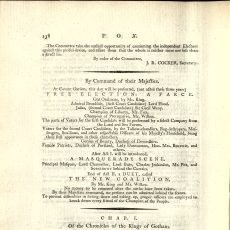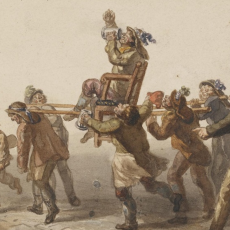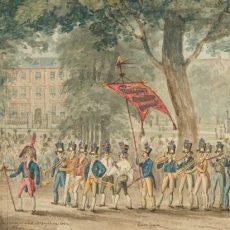Mar
1820
Bristol
Contested
GENERAL ELECTION
Poll book data from:
Holding: Bristol Archives
Citation: MS 45934/115
Source: Jeremy Gibson and Colin Rogers (eds.), Poll Books, 1696–1872: A Directory of Holdings in Great Britain (4th edn., Bury, 2008).
Timeline & Key Statistics
Contexts & Remarks
Dates: Tuesday 7 Mar.-Thursday 9 Mar. 1820
Poll book reference: Bristol Archives, MS 45934/115.
Candidates: Henry Bright (Whig), Richard Hart Davis (Tory), James Evan Baillie (Whig).
Henry Bright was the son of Bristolian banker and merchant, Richard Bright. Bright was invited to stand for Bristol in 1820 to represent the West India Whig interest. He opposed Catholic emancipation, and favoured moderate parliamentary reform, tax cuts, and 'reducing the power of the crown to its legitimate bounds'.
Richard Hart Davis had been elected MP for Bristol in the by-election of 1812. A Bristolian banker and merchant who traded to the West Indies and was a member of the Society of Merchant Venturers, he opposed Catholic Emancipation. He campaigned on the platform that 'treason, sedition and blasphemy walked fearlessly abroad'.
A member of the Whig club Brooks's, James Evan Baillie was the brother of former MP, Hugh Duncan Baillie. He was also a partner in the Bristol Old Bank and an active member of Evan Baillie, Sons & Co., a West Indian trading company. He was formerly MP for Tralee from 1813 to 1818 before being proposed for Bristol by the reformers without his consent in 1820.
A show of hands indicated preference for Bright and Baillie, prompting Davis to demand a formal poll. Baillie withdrew from the election on Wednesday, 8 March, but the Tories were determined to keep polls open until both Bright and Davis had equal votes. The election returned Bright and Davis, concluding with dinners for their supporters at the Assembly Rooms and White Lion respectively.
Cultural Artefacts
Poll Book
Below is a digitised version of the poll book for this election:






